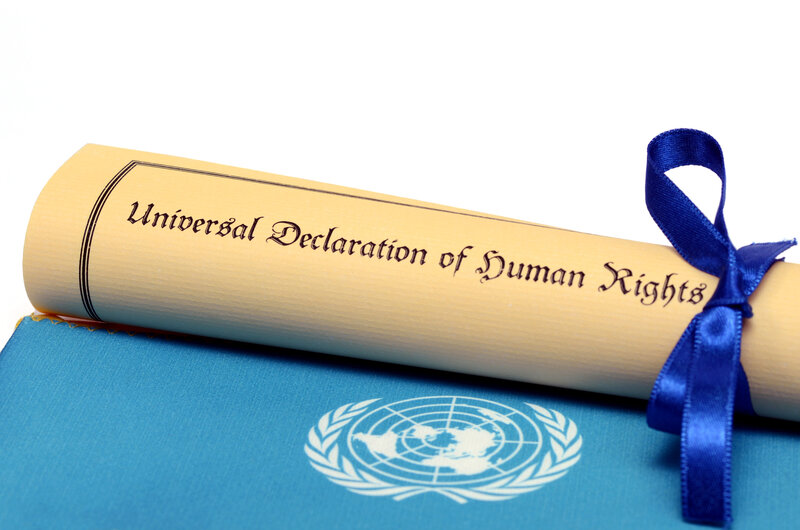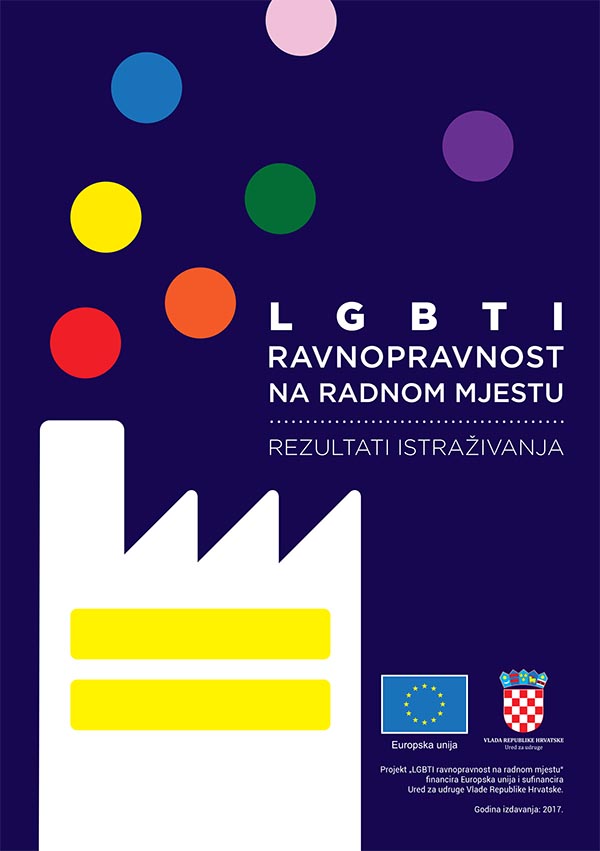Combating discrimination
"All human beings are born free and equal in dignity and rights."
(Universal Declaration of Human Rights, Article 1)
Background
When we talk about LGBTI persons’ rights it’s important to point out that they aren’t any special rights but human rights which belong to all of us because we are human beings.
Unfortunately, LGBTI persons are discriminated against in various areas of their lives: during employment and at their workplace, during schooling, in their family, healthcare, while accessing services and so on. That means that their different rights are endangered and/or denied, for instance the right to life, right to human dignity, rights to liberty and security of person, right to found a family or right to health care.

In about 70 countries in the world, it is punishable by law to be gay or lesbian, the sentences vary up to lifelong prison sentences and there are even countries in which lesbians and gay people can get the death sentence because of their same-sex orientation. More about the state of LGBTI human rights can be found on the webpages of the International organisation for LGBTI rights protection - ILGA world and ILGA Europe.
According to the survey of the European Union Agency for Fundamental Rights (FRA) in EU countries (28), Serbia and North Macedonia, 42% of LGBTI persons have felt discriminated against or harassed in the last 12 months based on their sexual orientation or gender identity (SOGI) in the country they live in. Only 9% reported discrimination. Further on, 49% of LGBTI persons in the last 12 months experienced some form of violence in their country. In Croatia, according to Zagreb Pride’s data, 64% of participants experienced some sort of violence based on their sexual orientation, gender identity, gender expression and/or sex characteristics.
LGBTI persons still have to hide their identity in public, as well as hide their relationships and marriages – 84% of LGBTI persons reported that they always or often avoid holding hands in public with their partners because of fear of violence, threats or harassment based on their SOGI (FRA, 2019).
At their workplace, LGBTIQ persons experience harassment and even threats from their coworkers or superiors, unfair work distribution or exaggerated supervision, prejudice concerning their ability to work with kids, false accusations, not getting promoted and no acknowledgment of their families as well as withheld benefits available to straight employees. The survey among LGBT persons in the Republic of Croatia about conditions in the workplace which was conducted by LORI in 2017, shows that 75,1% of questioned LGBT persons experienced some type of discrimination, harassment and/or abuse at the workplace. The survey of employers in the Republic of Croatia on policies and practices related to LGBTI employees, (LORI, 2017) showed that 80,40% of employers don’t have measures, policies, or practices in which they show openness towards LGBT persons but 60% of employers express willingness to participate in trainings and educations.
This societal injustice is present in the education system as well, and is being perpetuated by institutional homophobia, biphobia and transphobia (through the invisibility or marginalisation of LGBTIQ contents in school programmes, homophobic and transphobic contents in school books, the non-existence or non-implementation of action plans and policies for combatting violence based on sexual orientation, gender identity and/or expression, homophobic, biphobic and transphobic speech in schools, LGBTIQ+ topics being put in a negative context in the education system...) and individual homophobia, biphobia and transphobia of different actors (such as negative attitudes of students and school staff towards LGBTIQ persons and so on) which is attested by many practical examples as well as research data.
Adding to the usual challenges of adolescence that their straight peers also go through, LGBTIQ youth must face accepting an identity that brings big stigmatization, social exclusion, and other negative consequences along with it. Adding on to the challenge of accepting oneself as a LGBTIQ person, research systematically shows that LGBTIQ+ students are a common harassment and peer abuse target in schools and that they’re being exposed to discriminating experiences. Only 4% of youth is completely out concerning their LGBTI identity in Croatian schools (FRA, 2019).
LGBTIQ activists are exposed to attacks, persecution and threats and often don’t feel protected neither by police nor by their country/government.
Programme activities
Within the programme “Combatting discrimination and advancing the rights of LGBTI persons“ we conduct various activities and projects which goal is to combat discrimination and violence and protect the rights of LGBTI persons. Some activities are within projects, such as LGBTIQ+ Work Equality Alliance, Supporting Inclusive Education - Building a Safe Future or Respect Human Rights – Build Inclusive Society.
One of the more important parts of the programme is informing and educating the public on LGBTIQ+ topics. Informing, sensitising and educating different types of professionals (teachers, psychologists, police staff, employers…) is done through one-day or multiple-day long seminars and trainings. Furthermore, we regularly publish educational publications and handbooks, e.g. Guidelines for combating homophobia, transphobia and peer violence based on sexual orientation and gender identity in schools, Yogyakarta Principles and Workplace Equality Indicator.
In order to raise public awareness about the importance of these topics and sensitise the public for a greater understanding and acceptance of LGBTIQ+ persons, as well reduction of prejudice and stereotypes, we organise campaigns, talks and other public events.
We continuously follow the needs of the LGBTI community and conducts surveys amongst LGBTI population in different fields – from research on youth needs to the discrimination of LGBTI persons at the workplace..
Monitoring the state of LGBTI human rights in Croatia and submitting annual reports for various national and international institutions are also relevant aspects of this programme. One particular part is advocating for bettering the rights and position of LGBTI persons and attaining equality. Our advocacy focus lies on the field of education and youth by strengthening advocacy capacities. For that purpose, we create analyses and report such as Curriculum and textbook analyses in Croatia and Review of international documents in the field of LGBTIQ human rights protection in education. LORI is also a member of the GOOD initiative Croatia and advocates for the implementation of civil education in Croatian schools. Apart from civil education, we advocate the implementation of health education - a comprehensive sexual education in schools.
Reacting to hate speech and hate crimes are also a relevant segment of this programme. We report hate speech, hate crimes and discrimination based on SOGI and/or violence against LGBTIQ persons to institutions responsible (State Attorney's Office of the Republic of Croatia, Ministry of the Interior of the Republic of Croatia, Ombudswoman for Gender Equality). Furthermore, LORI offers free legal support to LGBTIQ persons in the case of experienced discrimination and/or violence.
As part of the programme, LORI marks important international dates connected to human rights: International Day Against Homophobia, Biphobia and Transphobia - IDAHOBIT, and together with other civil society organisations we organise actions for International Womens day, Human Rights Day, International Day for the Elimination of Violence Against Women etc.
Although the programme focuses on Combatting discrimination and violence against LGBTIQ+ persons, it also includes a fight against sexism, misogyny, racism, fascism and activities aimed at the protection of women’s and reproductive rights.



